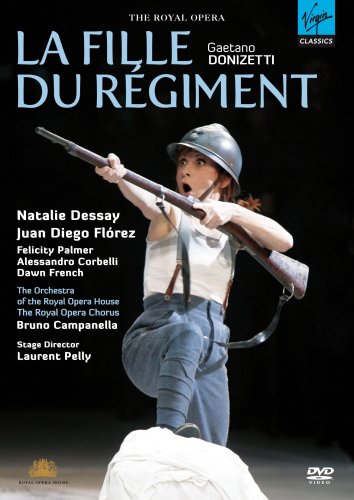La fille du regiment DVD Review
I watched this rendition of La fille du regiment with the excellent Natalie Dessay and Juan Diego Florez a few weeks ago and I am now getting around to my review of it. All in all, it was an excellent production. The leads did great jobs with just a few small foibles, and the supporting cast was superb in both acting and voice.
 The acting overall is quite good. Florez, for his part, has some rote gestures that he does again and again (particularly turning away and turning back before starting a phrase). However, he does a good job of acting the part with a sincerity that has been unusual until recently for tenors in particular. That said, there have been exceptions in the past and there are a wide variety of tenors with acting ability currently on the stages. Florez isn't an exquisite actor above the rest, but he's good enough without a doubt. The supporting singers all play their roles well, especially Felicity Palmer (except not so well when she's singing). Because these are character roles they don't require a massive range of emotions but they do require excellent ability to portray that character, and all the supporting singers do bring this to the fore. Natalie Dessay really steals the show in terms of acting ability. Dessay's ability to represent the tomboyish yet flirtatious Marie is superb. It requires an excellent blend of unexepected masculinity and endearing femininity. Her acting doesn't suffer through her singing, nor the other way around. She is the consummate singing actress.
The acting overall is quite good. Florez, for his part, has some rote gestures that he does again and again (particularly turning away and turning back before starting a phrase). However, he does a good job of acting the part with a sincerity that has been unusual until recently for tenors in particular. That said, there have been exceptions in the past and there are a wide variety of tenors with acting ability currently on the stages. Florez isn't an exquisite actor above the rest, but he's good enough without a doubt. The supporting singers all play their roles well, especially Felicity Palmer (except not so well when she's singing). Because these are character roles they don't require a massive range of emotions but they do require excellent ability to portray that character, and all the supporting singers do bring this to the fore. Natalie Dessay really steals the show in terms of acting ability. Dessay's ability to represent the tomboyish yet flirtatious Marie is superb. It requires an excellent blend of unexepected masculinity and endearing femininity. Her acting doesn't suffer through her singing, nor the other way around. She is the consummate singing actress.
The set is minimalistic yet nicely. The beauty of it lies in some props like the washline that Dessay manipulates and the map painted upon the floor, as well as the quasi-rocky elevation in the back. In the second act, the set changes and becomes more elaborate as a house which serves to confine the stage just as Marie is confined by her forced station. Similarly, the acting in act one begins as hokey from everyone except the two main characters (and even they stray sometimes). This gives the whole thing a lighthearted and somewhat farcical feel. However, in the second act the chorus (courtesy of the ROC) and minor characters (as well as the major characters) change to a more poignant form of comedic acting. This is a more powerful way to bring home the story, which I think is a good switch. Whether or not this switch is intentional and whether or not the opera could have started out in this poignant fashion, I'm not sure, but the switch works just fine.
Lastly, the singing. It is important to point out that there is spoken dialogue in La fille du regiment. I recently heard someone describe this opera as, therefore, an operetta. It is unrealistic to put it this way. It is true that by technical, very stringent standards, an opera has no spoken word. However, we call lots of works that do possess spoken word operas. Indeed, works of Britten contain spoken word. Even Carmen contained spoken words before recits were fashioned for all the dialogue. Due to these blurred lines and the level of singing necessary to sing La fille du regiment, it is only fair to call it an opera. In this opera, the supporting singers do an excellent job of not only singing well, but giving their voices colors appropriate to their character, whether the commander of a regiment, a haughty marquises, or a prima donna duchess, they all fit. Natalie Dessay has excellent control of her voice with spot-on coloratura. It does seem that she flags just a bit toward the end of the second act, but she manages to cover it well and hang on. Juan Diego Florez is in his typical ringing vocal style, easily accessing high notes and yielding a thrilling tone to his singing. Sometimes he feels a bit monotonous, but all in all, he's one of the best singers alive currently.
La fille du regiment was an exciting opera to watch, and I'll be excited to see the next DVD performance that happens to come my way!
 The acting overall is quite good. Florez, for his part, has some rote gestures that he does again and again (particularly turning away and turning back before starting a phrase). However, he does a good job of acting the part with a sincerity that has been unusual until recently for tenors in particular. That said, there have been exceptions in the past and there are a wide variety of tenors with acting ability currently on the stages. Florez isn't an exquisite actor above the rest, but he's good enough without a doubt. The supporting singers all play their roles well, especially Felicity Palmer (except not so well when she's singing). Because these are character roles they don't require a massive range of emotions but they do require excellent ability to portray that character, and all the supporting singers do bring this to the fore. Natalie Dessay really steals the show in terms of acting ability. Dessay's ability to represent the tomboyish yet flirtatious Marie is superb. It requires an excellent blend of unexepected masculinity and endearing femininity. Her acting doesn't suffer through her singing, nor the other way around. She is the consummate singing actress.
The acting overall is quite good. Florez, for his part, has some rote gestures that he does again and again (particularly turning away and turning back before starting a phrase). However, he does a good job of acting the part with a sincerity that has been unusual until recently for tenors in particular. That said, there have been exceptions in the past and there are a wide variety of tenors with acting ability currently on the stages. Florez isn't an exquisite actor above the rest, but he's good enough without a doubt. The supporting singers all play their roles well, especially Felicity Palmer (except not so well when she's singing). Because these are character roles they don't require a massive range of emotions but they do require excellent ability to portray that character, and all the supporting singers do bring this to the fore. Natalie Dessay really steals the show in terms of acting ability. Dessay's ability to represent the tomboyish yet flirtatious Marie is superb. It requires an excellent blend of unexepected masculinity and endearing femininity. Her acting doesn't suffer through her singing, nor the other way around. She is the consummate singing actress.The set is minimalistic yet nicely. The beauty of it lies in some props like the washline that Dessay manipulates and the map painted upon the floor, as well as the quasi-rocky elevation in the back. In the second act, the set changes and becomes more elaborate as a house which serves to confine the stage just as Marie is confined by her forced station. Similarly, the acting in act one begins as hokey from everyone except the two main characters (and even they stray sometimes). This gives the whole thing a lighthearted and somewhat farcical feel. However, in the second act the chorus (courtesy of the ROC) and minor characters (as well as the major characters) change to a more poignant form of comedic acting. This is a more powerful way to bring home the story, which I think is a good switch. Whether or not this switch is intentional and whether or not the opera could have started out in this poignant fashion, I'm not sure, but the switch works just fine.
Lastly, the singing. It is important to point out that there is spoken dialogue in La fille du regiment. I recently heard someone describe this opera as, therefore, an operetta. It is unrealistic to put it this way. It is true that by technical, very stringent standards, an opera has no spoken word. However, we call lots of works that do possess spoken word operas. Indeed, works of Britten contain spoken word. Even Carmen contained spoken words before recits were fashioned for all the dialogue. Due to these blurred lines and the level of singing necessary to sing La fille du regiment, it is only fair to call it an opera. In this opera, the supporting singers do an excellent job of not only singing well, but giving their voices colors appropriate to their character, whether the commander of a regiment, a haughty marquises, or a prima donna duchess, they all fit. Natalie Dessay has excellent control of her voice with spot-on coloratura. It does seem that she flags just a bit toward the end of the second act, but she manages to cover it well and hang on. Juan Diego Florez is in his typical ringing vocal style, easily accessing high notes and yielding a thrilling tone to his singing. Sometimes he feels a bit monotonous, but all in all, he's one of the best singers alive currently.
La fille du regiment was an exciting opera to watch, and I'll be excited to see the next DVD performance that happens to come my way!






Comments
Post a Comment